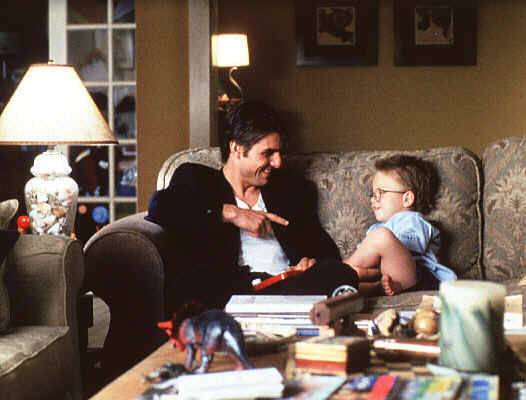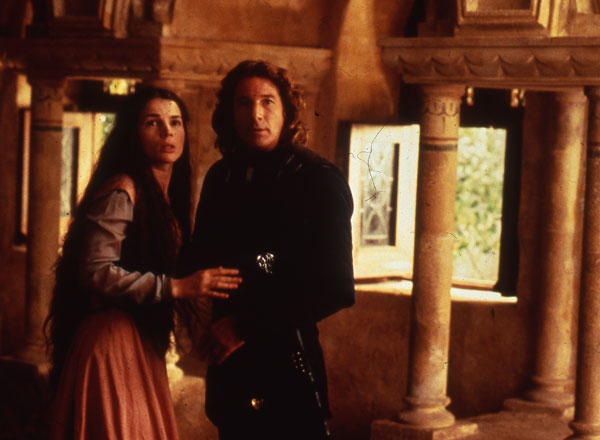Movie
You've Got Mail!
 |
|
| Articles on You've Got Mail |
|
|
| Plot Summary |
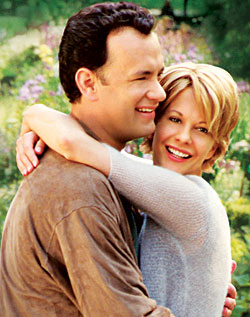 Kathleen Kelly is the owner of a little and famous bookstore for children's books in Manhattan, New York. Suddenly, her business gets endangered by the opening of Fox Books discount store just "around the corner". She meets Joe Fox, son of the owner, and soon gets annoyed by his arrogant way of managing business matters. Kathleen Kelly is the owner of a little and famous bookstore for children's books in Manhattan, New York. Suddenly, her business gets endangered by the opening of Fox Books discount store just "around the corner". She meets Joe Fox, son of the owner, and soon gets annoyed by his arrogant way of managing business matters.Joe and Kathy become bitter business enemies when Joe's superstore puts Kathy's little shop out of business. Meanwhile, the two of them meet in an online chatroom under the pseudonyms NY152 and Shopgirl, without knowing each other's the identity. What starts as anonymous flirting via e-mail slowly converts into a deeply meaningful relationship in which they confide in each other, share everyday life problems, and exchange their inmost thoughts and feelings. They finally agree to meet face-to-face. Joe discovers Shopgirl's true identity just before going to meet her. Realizing she will never accept him as her on-line friend when she knows who he really is, he conceals his true identity and creates occasions to run into her apparently by accident. Each time they meet, she abuses him for his cruel, ruthless business practices. Attracted by her gentle, affectionate sweetness, he comes to truly appreciate and understand Kathy's view of things. By contact with her, the ruthless, arrogant, sarcastic businessman gradually awakens to the joy of warm human relationship, small joys and compassionate human values. In exchange Kathy learns from Joe to be more assertive, face the challenges of life boldly, take hard decisions and move beyond the sense of failure arising from the closing of her store. Increasingly attracted to the real life Joe, her mind clings to the anonymous relationship with NY152, until Joe finally discloses that the two men she loves are one and the same person. |
Directed by Nora Ephron
Screenplay by Nora Ephron & Delia Ephron
Starring Meg Ryan and Tom Hanks
Copyright belongs to Warner Bros. Pictures
- Wikipedia provides the plot summary, background, publication history and extensive links to sites on You've Got Mail, the cast and producers.
- The Internet Movie Database, IMDB has information related to the movie and its actors.
- Warner brother's website for You've Got Mail.
- Watch You've Got Mail Trailer from YouTube.
Jerry Maguire
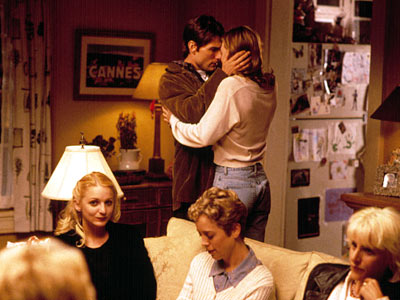 |
|
| Articles on Jerry Maguire |
|
|
| Plot Summary |
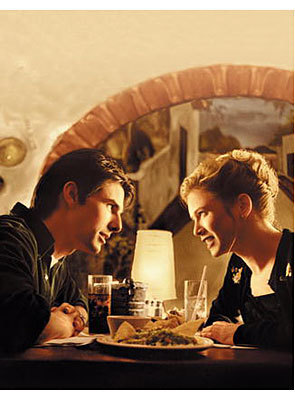
Jerry Maguire (Tom Cruise) is an agent with a major sports management firm. He's enthusiastic, successful, a great negotiator and people like him. But it begins to dawn on Jerry that there's something wrong with what he's doing, and not long after a troubling encounter with the son of an injured athlete he represents, Jerry has a serious crisis of conscience. In the midst of a sleepless night, Jerry writes a memo calling on himself and his colleagues to think more about the long-term welfare of the clients they represent and less about immediate profits. While everyone around him applauds the sentiment, Jerry's superiors think his ideas are bad for business; Jerry is fired, and, rather than standing in solidarity with him, his "friends" in the firm scramble like sharks to claim Jerry's clients. At the end of his last day, the only people willing to join Jerry as he strikes out on his own are staff accountant Dorothy (Renee Zellweger), a single mother secretly in love with him, and Rod Tidwell (Cuba Gooding Jr.), a football player whose pride and arrogance have gotten in the way of his reaching his potential. Jerry and Dorothy bond both professionally and romantically, which is a good thing since Jerry's fiancé, Avery has left him after his fall from the ranks of the rich and famous. Jerry is also drawn to Dorothy's son, Ray, and soon he and Dorothy become involved. But Jerry's future rides on renegotiating Tidwell's contract and during this time he learns that it's best to work from the heart as well as from the head in both his professional and personal life. |
Directed by Cameron Crowe
Screenplay by Cameron Crowe
Starring Tom Cruise as Jerry Maguire,Cuba Gooding Jr.as Rod Tidwell,Renée Zellweger as Dorothy Boyd
Copyright belongs to Gracie Films and Tristar Pictures
- Wikipedia provides the plot summary, background, publication history and extensive links to sites on Jerry Maguire, the cast and producers.
- The Internet Movie Database, IMDB has information related to the movie and its actors.
- Starpulse provides information on Details of the movie, Videos and other links on Jerry Maguire.
- Watch Jerry Maguire Trailer from YouTube.
First Knight
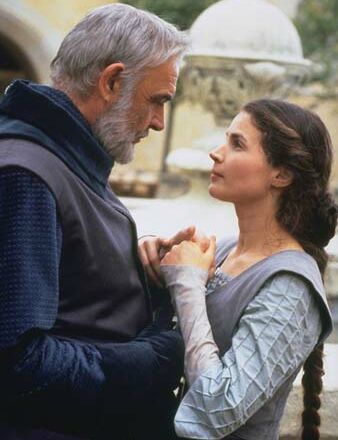 |
|
| Articles on First Knight |
|
|
| Plot Summary |
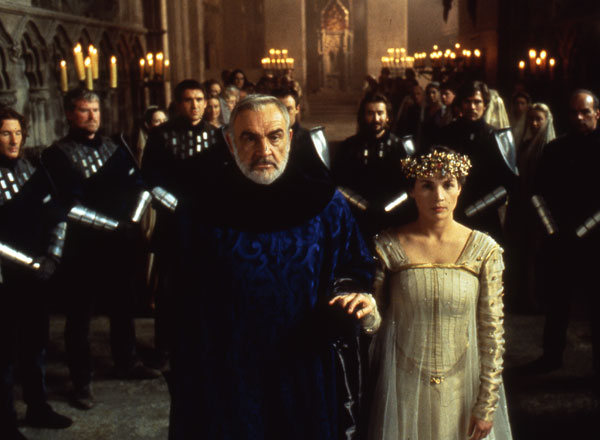
On the way to Camelot to meet King Arthur, her ally and future husband, Lady Guinevere and her retinue are attacked by Arthur's mortal enemy, Prince Malagant, who wants possession of Guinevere's land. Lancelot, a wandering adventurer and unparalleled swordsman, rescues her from her attackers. In return, he asks for a kiss from the lovely Lady -- a request that Guinevere coldly refuses.They meet again when Lancelot turns up at one of Camelot's public tournaments. When Malagant kidnaps Queen Guinevere from Camelot, Lancelot single handedly pursues and rescues her and finally wins her heart. Inspired by the high principles he has learned from Arthur and conscious of the impossible dilemma he has placed her in, Lancelot tells Guinevere that he has decided to leave Camelot. Unable to resist her heart’s passionate love for him, she is discovered by the king while exchanging a single kiss with Lancelot. Arthur feels angry and betrayed by his wife and trusted knight. When Malagant attacks Camelot, Arthur is killed in the act of defying him. On his death bed, he charges Lancelot with both his kingdom and his wife. |
Directed by Jerry Zucker
Screenplay by William Nicholson
Starring Sean Connery as King Arthur, Richard Gere as Lancelot, Julia Ormond as Guinevere
Copyright belongs to Columbia Pictures Corporation
- The Internet Movie Database has information related to the movie and its actors.
- Wikipedia offers all details of the story and movie First Knight.
- This site offers interesting review of this movie First Knight
From Conflict to Enduring Romance
The phrase ‘love-hate relationship’ expresses a deeper truth that in intimate relationships love and hate are not really opposites. They are both forms of intense relationship. The true opposite of love and hate is a state of neutrality where two people are oblivious or indifferent regarding each other’s existence. That is why we find numerous instances in both life and literature of intensely negative relationships gradually or suddenly evolving into their very opposite.
Why is it that sometimes we see intense dislike rapidly transformed into intense attraction or lasting affection? Physical attraction and short term infatuation are usually based on surface appearances or superficial similarities. Whereas, love and romance derive their enduring intensity from complementarity between partners at deeper levels of personalities. Often complementarity in the depth goes along with sharp differences on the surface, so the initial response may be indifference, dislike, opposition or even conflict. This is the truth behind the evolving relationship between Darcy and Elizabeth in Pride & Prejudice , which commences with dislike, develops into conflict and then gradually evolves into romantic love.
This same phenomenon is depicted in You’ve Got Mail, a popular comedy combining love on the internet with real life conflict. Like Darcy and Elizabeth, the two main characters transform their relationship from bitter antagonism to true romance. Kathleen Kelly runs The Shop Around the Corner, a quaint little children's bookstore in New York's Upper West Side, made popular by her mother for its personal touch and homey atmosphere. Living with a newspaper columnist, Frank, whom she thinks she is in love with, Kathleen believes her life to be going well and enjoys the company of her friends and employees. Her life suddenly turns upside down when a large discount bookstore run by Joe Fox opens around the corner. Joe Fox is a cut-throat businessman, with a thriving business and a satisfying personal life living with his girlfriend, Patricia, an equally arrogant, business-like book editor.
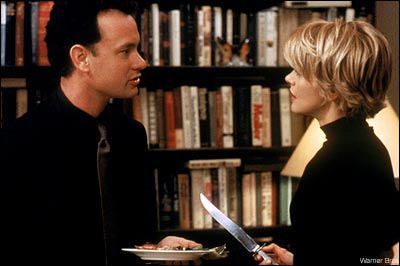
Joe and Kathy become bitter business enemies when Joe's superstore puts Kathy's little shop out of business. Meanwhile, the two of them meet in an online chatroom under the pseudonyms NY152 and Shopgirl, without knowing each other’s identity. What starts as anonymous flirting via e-mail slowly converts into a deeply meaningful relationship in which they confide in each other, share everyday life problems, and exchange their inmost thoughts and feelings.
They finally agree to meet face-to-face. Joe discovers Shopgirl's true identity just before going to meet her. Realizing she will never accept him as her on-line friend when she knows who he really is, he conceals his true identity and creates occasions to run into her apparently by accident. Each time they meet, she abuses him for his cruel, ruthless business practices. Attracted by her gentle, affectionate sweetness, he comes to truly appreciate and understand Kathy's view of things. By contact with her, the ruthless, arrogant, sarcastic businessman gradually awakens to the joy of warm human relationship, small joys and compassionate human values. In exchange Kathy learns from Joe to be more assertive, face the challenges of life boldly, take hard decisions and move beyond the sense of failure arising from the closing of her store. Increasingly attracted to the real life Joe, her mind clings to the anonymous relationship with NY152, until Joe finally discloses that the two men she loves are one and the same person.
The dramatic twists and turns of the story make good entertainment, but appear at first glance too implausible to hold lessons for real life. In fact, their relationship illustrates some profound truths of real life romance. Like Darcy and Elizabeth, Joe and Kathy start off their relationship on the wrong foot, deeply prejudiced and in open conflict with one another. Like Darcy, Joe is the first to perceive beyond their superficial differences the deeper commonalty and complementarity they share. He takes steps to overcome the animosity and resentment that separates them by employing several of the strategies mentioned on this site . (See Romance Strategies)
Like Darcy, Joe realizes that any change in the status of their relationship will have to be by his initiative. He takes responsibility for what has happened and decides that it is in his power to change the situation. He is the one who has offended her and he is the one who has to make amends. He does so not by any outward signs of flattery, apology, or wooing in the normal sense, but by trying to get to know Kathy and relate to her genuinely. First as NY152 and later as Joe, he offers her genuine positive attention and learns to listen deeply and truly to Kathy’s concerns without passing judgment or reacting to anything she says. Delighted to find someone to whom she can bare her soul and be accepted as she is, Kathy warms first to the anonymous stranger and eventually to her former enemy. Joe’s patient listening is not mere formality. He takes genuine interest in who she is and what she feels and comes to appreciate her perspective on life, which is so very different than his own. Unable to resist the gratification arising from such deep sympathy, Kathy begins to see Joe differently.
Attention, listening, understanding and taking the other person’s point of view can convert a bitter enemy into an intimate friend, but they are not enough to generate deeper feelings of love. For that, the relationship has to go beyond mere listening and become a genuine act of sharing and self-giving. Like Darcy, Joe not only listens and understands. He also honestly acknowledges and accepts the need to change himself. More importantly, he does all this without asking, demanding or expecting anything in return. He does not seek a physical relationship. He does not expect her acceptance or appreciation. He simply gives of himself, quietly and unostentatiously. When completely genuine and done with pure goodwill, this approach unfailing wins the other person. When done out of need or calculation, it evokes a response of need or taking in the other person.
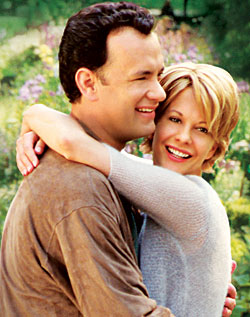
Many people are willing to accept the other person as they are during the initial period of courting. But how many can truly extend freedom to a partner to be and live as themselves rather than as what we want them to be? The romantic feelings that grow between Joe and Kathy are not mere infatuation or physical attraction. Initially they gravitate toward one another without even knowing what the other person looks like. It is commonalty of mind and feeling that draws them together. The fact that they have already met and disliked each other socially reflects the truth that often we are attracted physically to those with whom no real affection is possible and superficially reject those with whom we are most deeply compatible. Contrary to popular belief, true romance is never determined by either physical appearance or social acceptability. The discovery of romantic compatibility makes the other person beautiful to our eyes, where previously we may have been indifferent. Beauty is truly in the eyes of the beholder. Rather romance is seen with the soul, not with the eyes.
Improbable as it may seem, Joe and Kathy, like Elizabeth and Darcy, discover that despite superficial differences, they have much to offer one another. Indeed, their deeper attraction arises precisely from the fact that they are so very different and therefore able to complement and complete one another. Kathy acquires something of Joe’s strength, confidence and spirit of adventure. She brings out his capacity for goodness, gentleness and self-giving. Their attraction to one another is founded upon the fact that knowing each other, they both become better, happier more fulfilled human beings.
For another in-depth example of the evolution from conflict to love, see the story of Darcy & Elizabeth.
For strategies to convert a conflict-based relationship into a harmonious, loving one, see Harmony Strategies and Romance Strategies
Choosing between Marriage and Romance
When a starry-eyed, young Italian woman named Francesca first met Richard Johnson in Naples at the end of WWII, he was not only a handsome American GI who came to liberate her country from the scourge of Fascism. He was also a passport and ticket from poverty and despair to a dream of fulfillment in the promised land. She followed him back to Iowa after the war, where they married and settled down on the Johnson family farm in Madison County. She thought Richard was everything a partner should be -- a loyal, gentle, caring husband, a good father, an honest, responsible, hardworking provider for the family. Together they raised a son and a daughter to adulthood, saw them marry and move on. Then Francesca and Richard spent the rest of their peaceful lives together managing the family farm.
That was all her family knew or thought about Francesca for all those decades she lived as a caring housewife and mother, but that was not all there was to her or all there was to tell. Upon her death, she bequeathed to her children a diary that told the tale of another Francesca and another life. It was a tale about four days that told a story that lasted a lifetime. It was the story of a young Italian woman with dreams that soared sky high -- dreams of passionate love and romance.
Some 20 years after her arrival in rural Iowa, the dream she had given up when she married Richard arrived at her door. His name was Robert Kincaid, a middle-aged photographer for National Geographic who roamed the world in search of stories and images to fascinate those who could only dream of adventure. He was a carefree wanderer, a loner without home or family bonds. He travelled from port to port meeting fascinating people, liking and loving and carrying fond memories, kind words and beautiful images away with him.
He came to Madison County to photograph some old wooden bridges, but what he found and what he left went far beyond the pictures that he took. He discovered a woman of deep feeling and refined intelligence who had locked away the dreams of youth deep in her heart and thrown away the key. Meeting him, those dreams of freedom sprang suddenly back to life. Meeting her, for the first time in his life he felt the irresistible urge for lasting connection and belonging to another person. In a mere four days, while her family was away at the state fair, Robert and Francesca discovered so much of one another and became so closely bound that he felt they were no longer separate people. It was impossible to say who was more deeply altered by their meeting. He was ready to give up decades of independence and she was prepared to walk away from her whole life and family, just so they could remain together.
When faced with the choice, he selfishly thought of his own need, but she selflessly thought of the devastating impact it would have on her good husband and growing children. He offered her the world. She had the insight and maturity to recognize that the moment she walked away with him, everything would change. Instead of looking forward with anticipation at a new and unknown future, she would look back with guilt and regret on a life abandoned with ingratitude. The magic of their brief meeting would not survive the humdrum routine of everyday life. Hadn't she dreamed once before and awakened to a less starry-eyed reality? They had met briefly in a common dream and would have to satisfy themselves with the memories of that ecstatic momentary experience. Heartbroken, she chose to remain on the farm. Decades passed. They never met again, but they lived out their lives constantly thinking, dreaming and cherishing one another. After his death she received a box of his most precious personal belongs, including a letter and a book of his photographs entitled Four Days.
Did Francesca make the wrong decision by marrying Richard and settling down to a quiet life on a farm? Did Robert suddenly realize his whole path through life had been a mistake? Both seem very unlikely. Human beings are too complex to be reduced to simplistic explanations or formulas of right and wrong. Life is not merely a set of cross-roads, forked paths and missed opportunities. Our needs, aspirations, capacities and potentials are unlimited. Life presents challenges and offers opportunities for the soul to develop some of those capacities, meet some of those needs and fulfill some of those aspirations. Our lives depend on those choices.
Had Francesca refused to follow Richard to America, she may very well have ended up as a farmer's wife in the tiny Italian seaport town of Bari where she was born. Or she may have married a drifter, roamed the world and longed for the peace and stability she had foregone. She had chosen instead a path that gave her physical freedom, economic security, social acceptance and psychological well-being. But it could not exhaust the longings of her soul which are infinite. Robert arrived in the mid course of her life to show her all she had missed and reignite the unfulfilled longings deep inside. He awakened a romantic love in her she had never felt before. He made her realize that she was more than the sum of her present life. Indeed, we all are. However much she was tempted, she knew she could not walk away from all life had given her and all she owed in exchange, in order to fulfill a romantic longing for freedom, adventure and romance. She had needed and wanted love and security and found it. Now Robert helped reawaken a part of herself that lay buried beneath. She felt more alive and infinitely richer for that experience. She discovered a part of herself she had not known or had long forgotten. Robert left, but that part remained with her.
What is this feeling, this experience that gripped two mature adults and shook the very foundations of their lives and personalities, never to be forgotten? It is romance. The meeting of a complementary personality who awakens dormant aspects of our own personality and touches us deeply at points where our routine life does not delve. That touch may be felt positively as an expansive opening of our being or negatively as an unwanted exposure of hidden attributes. Either way, it is intensely alive and it can be life changing. Confusion arises when we conclude that a person who raises this intense feeling in us is necessarily the one who can bring us the greatest happiness and fulfillment in life. That is not necessarily true. Romance is an adventure that requires constant risk and perpetual self-giving. Comfort, security and possessiveness have nothing to do with true romance. Robert was correct when he said that this type of relationship happens once in a lifetime. That is not because opportunities for love and self-giving are rare, but rather because we rarely give that expansive, unconditional opening to life and other people.
Francesca and Robert found four days of intense, ecstatic romance, because they accepted one another as they were without wanting to judge or change anything to make it different or better and because they gave themselves to one another without asking or expecting anything in return. Few people are capable of accepting another with that purity and totality. Fewer are capable of giving themselves without asking for anything in return. By the end of their brief romance, they both painfully and urgently wanted more, but they chose instead to settle for dream they could remember always. They had discovered the truth that romance and marriage do not often go together.
The value of an experience can best be assessed by its consequences, rather than in the heat of the moment when emotions overtake us. What were the consequences of their four days together? Even though they never met again, this experience imparted a deeper meaning and value to their lives. It made them feel more alive and caring. Perhaps it made Francesca a more affectionate wife. When her children learned the truth after her passing, it affected each of them profoundly. Her son realized that he had not sufficiently appreciated the woman he married or tried hard enough in his relationship with her. Whereas her daughter realized that she had submitted to the humdrum routine of marriage and stopped trying to discover more purpose in her own life. Francesca’s dream lives on in her children. Was there something unique about Robert that enabled he alone to awaken romance in Francesca or could she have awakened the same romantic feeling in her relationship with Richard or someone else? The person, the timing and the circumstances facilitate the awakening. She had come to the age when her children were grown up and preparing to leave, so a search for new meaning was natural. Had she tried consciously, she might have discovered greater richness and meaning in relating to her children as openly as she related to Robert, or in taking up a career to challenge her intellect and sensibilities, or in striving consciously to become a more giving wife. Richard was a good-hearted man, but physical and unsophisticated. Yet had she tried to discover his own suppressed needs and aspirations, she may have made his life a heaven on earth and blossomed in the process.
Their social environment also played a role in the outcome. We learn how Lucy Redfield has been condemned and outcast by the small town mentality for having had an extramarital affair. Francesca could not help thinking how her relationship with Robert would be viewed in a similar light. Recognizing their common bond, she broke the local boycott and became fast friends with Lucy, yet still waited several years before disclosing the secret of her own affair. Had Robert lived nearby she may never have responded to him or her response may have quickly dissipated by fear of social condemnation. The fact that he came and then left helped her keep alive the dream. There are many possibilities, but the essential truth is that we discover romance in ourselves. The other person only facilitates that discovery.
We all may long to experience it and dream of living it, but how many of us have the strength and courage to live always unprotected, exposed and vulnerable, to give all we are to another with no assured returns of any kind? Those who are capable of that attitude can discover romance in any relationship, because the romance lies within themselves. Those that are not may wander the globe finding new partners in every port, but never finding the treasure that lies within them.
If you would like to raise general questions on romance, love, marriage and relationship or about any of the content in this article, please post your entry in the appropriate forums
Love, Romance, Sex & Marriage
The true relationship between love, romance, marriage and sexual attraction is a source of endless confusion and controversy in modern society. Very often they are mistaken for one another both in theory and practice, becoming the source and occasion for bad decisions and failed or unfulfilling relationships.
Will, Emily, April and Summer (Definitely Maybe)
The confusion between sexual passion and romantic love is beautifully illustrated in this story of a handsome young man's love affairs with three beautiful, sexually attractive women. Will Hayes, a thirty-something married dad on the eve of divorce and striving to discover the true basis for romantic love, narrates the history of his relationship with these three women to his 10 year old daughter Maya. Will's first love is Emily, lovely co-ed at the University of Wisconsin who he regards as his future wife. He leaves Emily to spend the summer in New York working as a volunteer in Bill Clinton's election campaign, where he meets April, who is making photocopies in the same office. Summer is an old friend of Emily's aspiring to become a political columnist. Will spends the next decade trying to figure out which of the three he really loves.
Emily seemed to sense Will's dilemma, even before he left for New York. She knew he had career ambitions and wanted the adventure of rising in life, while her own inclination was to settle down to a comfortable and conventional married life in the Midwest. Lovely enough to find a hundred husbands, Will was her ideal choice, but even before he left for NY, she feared that the energy and excitement of the big city would lure him away from her. Will remained faithful and frequently asked Emily to follow him. When she finally agreed to come for a visit, Will proposed to her and Emily confessed that she had slept with Will's college roommate. She said she had done it out of fear that a commitment to Will would ultimately end indisappointment and her fear proved to be true. Will was disgusted and rejected her.
If Emily represents the attractions of a near-perfect wife, Summer was every man's dream of a perfect love affair. Beautiful, intelligent, sexually alluring and aggressive, she took Will's breath away. After a brief period of ecstatic sexual intimacy, he felt hopelessly in love and determined to propose. The very day he planned to give her an engagement ring, Summer published an article exposing the indiscretions of the politician Will was trying to get elected and trashing all hopes for the campaign, for Will's career and for his relationship with Summer. They both realized that Summer was not a woman who needed or could settle down in a permanent relationship. She enjoys freedom too much. Her first priority is her own career. Will walked away furious and deeply disappointed.
April was an intermittent spectator to Will's other love affairs, a friend he met frequently, corresponded with, and shared his inmost feelings with. He found April extremely attractive but he always felt that intimacy between them would be impossible, because they were so very different and opposite in many respects. They seemed to constantly challenge each other's beliefs and values. Their discussions often ended in agreeing to disagree. Just once on the eve of Emily's visit to New York, Will and April almost let their physical attraction for one another overtake them, but Will pulled back out of loyalty to Emily and a strange sense of hesitation. April went through numerous relationships of her own, none fulfilling, travelled overseas and returned to New York to discover Will preparing to propose to Summer. After Summer refused him, Will got drunk and found the courage to confess to April that he loved her. Clearly moved and deeply in love with Will, April refused to take him on the rebound and told him to get his life together.
Sometime later Will meets Emily again, marries and lives with her until Maya is 10 years old. Then they decide to divorce. We are never told why they divorce, but we sense that what Emily felt from the beginning had proven to be true. Although they are both good, pleasant people and like each other, the elusive magic of romantic love did not outlast the initial period of infatuation. They never had a serious problem, but something essential was missing. What they had might have been more than enough for a normally successful marriage, but not for someone seeking real romance.
Listening to Will's story, Maya perceived what Will had never understood. All the time his real love had been April, only he had been too frightened to admit he loved someone he believed would never accept him. Will had mistaken the surface differences that separated them for real incompatibility, when in fact at a deeper psychological level they were a perfect match. They both sought a life of meaningful ideals, not mere marital security or sexual adventure, but neither had ever found it with anyone else. At Maya's insistence, they call on April and the truth of their love for one another becomes evident. It is significant that the woman Will found most intensely attractive sexually was the least capable of a lasting love relationship and the woman he had never slept with during a decade of relationship was the woman most capable of fulfilling his quest for romance.
Three women with three dominant motives for seeking a relationship with Will. Emily's aspirations are social. She wants the security of a conventional marriage. Summer's are physical and sexual. She wants the thrill of a torrid affair. April's are essentially psychological, which is the true basis for romance. She is looking for a partner who seeks to grow and will help her grow. That does not exclude marriage or sexuality but it rises far above them in her value system, therefore she rejects both options when they are initially offered to her by Will. Only when he becomes conscious of his deeper love for her does she accept him.
Sexuality, Love and Romance
Controversy, confusion and conflict regarding the rightful place of sex in intimate relationships is extremely widespread, because of differing perceptions, attitudes and personal preferences. Many people mistake sexual attraction for affection, love and romance, when in fact the issues are unrelated. Sexual enjoyment by itself is never a sufficient basis for lasting, positive human relationships. Love and romance can very well exist and thrive without sex. More often than not they are spoiled by according inordinate importance to a physical passion at the expense of real love and affection. A clear understanding of sexual attraction can help remove the confusion and the controversy.
Human consciousness consists of physical, vital-nervous, emotional and mental dimensions. Sexuality is an instinctive physical urge which nature uses to foster procreation, but it is not the real basis for harmonious, affectionate or romantic relationship. In fact, it often becomes the source of problems because men and women differ with regard to sex, a difference clearly seen in other animals. The instinct of the female is to attract the male sexually in order to conceive. The pleasure derived from the act is secondary to the biological need and urge for conception and birth of offspring. The cyclic changes in hormones related to fertility also affect the sexual urge. In contrast, the male instinct in animals is neither limited to conception or to times of the month. Problems arise when a man interpret a woman's lack of sexual interest as psychological rejection or a woman interprets a man's persistent interest as if it were some kind of ulterior motive. Human beings in general have become more educated, sophisticated and capable of intimacy than other species, but many have not acquired the understanding, maturity and capacity for self-giving required to accord sex its proper place in a relationship.
Our human capacity for happiness, affection, love and romance arises because we have acquired higher emotions and mental capacities. Sexual attraction has little to do with romance, affection or lasting happiness and can distract attention from the true basis for it. To give sex the central place in intimate relations is to give inordinate importance to the physical aspect of man-woman relations. Making it an issue can actually deprive a relationship of the love and affection it would otherwise possess. On the other hand, those who are capable of more exalted emotions may find physical intimacy a powerful medium for expressing those emotions and sharing themselves with their partner. In that case, physical contact serves as a means of expression, not as an end in itself. Romance is an ennobling emotion, not a physical sensation.
From Sexual Attraction to Friendship to Affection (When Harry met Sally)
This movie shows how sexual attraction and relations can have a disruptive impact on couples in the process of falling in love. Harry has spent the past fifteen years in and out of unfulfilling sexual relationships and has finally come to realize that he prizes real love and affection far more that sexual gratification. When they violate their own mutual decision to remain platonic, their budding relationship goes into a tailspin. He begins to think of her as another physical relationship. She begins to feel cheap and used. It takes time for them to put sex in right perspective and decide that with or without it they really did have a relationship worth cherishing and preserving.
The Reluctant Lover (Possession)
Maud Bailey, English poetry professor in her 30s, meets Roland Michell, an American scholar who travels to London on a fellowship. Together they strive to unravel the secret romance between Victorian poets Randolph Henry Ash and Christabel LaMotte. Neither of the moderns seem made for love. Bailey is cold, almost frigid, concealing her beauty to avoid attracting attention to herself, suspicious of any man's sexual intentions and eager to avoid relationships. Michell too has had enough of unfulfilling and sometimes hurtful relationships centered around sex. As they uncover details of the passionate love affair between Ash and LaMotte, the poetry of that relationship infiltrates their cold hearts and awakens a flame of real emotional intensity. Maud's heart melts and she feels tempted by the lure of sexual relationship. Uncharacteristically, it is Michell who pulls back for fear of spoiling a relationship he has come to value far more than physical pleasure. His abstinence awakens a deeper relationship between them that melts the defensive barriers and leads them to a discovery about the poets they are studying and about themselves.
An Unusual Arrangement (In the Mirror has Two Faces)
The role of sex in romance and marriage is humorous depicted in this story of a sexually- obsessed math professor and an English professor in quest of ideal romance. Greg is a handsome bachelor pursued by women, including his ex-wife, whom he finds physically irresistible, but he never succeeds in developing lasting relationships with any of them. After years of meaningless sexual exploits, Greg decides to seek a platonic relationship with a physically unattractive woman, so that the temptation for sex will be removed. He meets Rose, who is homely, lonely and frustrated, and they become increasingly intimate with her. He is attracted by her intelligence, natural humor and good values. She finds him pleasant company and a good companion. Eventually Greg asks Rose to marry him, on the understanding that sex will have little or no place in their relationship. Rose agrees, but finds it increasingly difficult to live up to their agreement. She is attracted to Greg physically and also feels rejected and unfulfilled because he does not feel the same way and because her own conception of romantic love includes physical passion.
While Greg is away in Europe, she loses weight, starts using make-up and dressing to reveal her physical charms. When Greg returns, he finds her very attractive and feels betrayed. He feels uncontrollable passions rising within him, which he has struggled to suppress because they had spoiled so many relationships in the past. Finally he confesses to Rose that he is so deeply in love that he cannot live without her and agrees to accept sexual relationship as a part of their relationship. They both come to realize that love, not sex, is the central issue. If their romantic attraction is true and deep, sex can be one means to express it.
The relationship of Rose and Greg is in sharp contrast to that between Rose's sister Claire and her husband Alex. Claire is the beautiful and vain younger daughter of a vain and aging mother who always considered physical beauty was her greatest asset and is now plagued by the scars of middle age. Like her mother, Claire values her beauty above all else and has used it to snare handsome, gallant Alex into a marriage. Once having caught him and won his admiration, Alex can provide no further gratification for her vanity from their marriage, so she immediately starts pursuing younger men to reinforce her sense of being attractive. Mistaking physical attraction for love, the more affection Alex expresses, the less satisfied Claire becomes. She needs the excitement of fresh conquests to prove her worth. Finally she leaves Alex for someone else, who surely will not be the last in a series of failed relationships based on physical attraction.
Ironically, for years Rose believed that she was deeply attracted and in love with Alex. When Claire rejects him, he seeks out Rose and wants to make love with her. Only then does Rose realize that her physical attraction for Alex was not real love. The relationship between Rose and Greg appears fanciful, but the issues it raises are real enough. Many people believe that sex is either indispensable for or incompatible with true romantic love, though most often it is the woman who comes to regard sex as disturbing or degrading physical lust which demeans the purity of their emotions. This is especially likely in instances where her partner seeks her for exactly that reason, physical pleasure, rather than for real emotional intimacy. The solution lies in recognizing sex for what it is and not placing too much importance on it one way or the other.
If you would like to raise general questions on romance, love, marriage and relationship or about any of the content in this article, please post your entry in the appropriate forums
Class, Caste, Culture & Marriage
Romantic attraction is not merely a matter of physical and emotional preferences. Human beings are social creatures. More often than not, what other people think of our partner is as important as our own personal opinion. One young woman wrote to IRES stating that she had decided to give up a boyfriend whom she liked very much because he was a very poor dresser and would not be acceptable to her friends. That may sound extreme to some, but most of us take the views of family or friends into consideration in one way or another. Differences in wealth, social status, culture, class and religion may seem dated and irrelevant in today's cosmopolitan, egalitarian world. But in most cases the outer distinctions which society makes correspond to real psychological differences between people that may seem irrelevant during the early stages of infatuation. But when relationships founded on romantic attraction eventually settle down to more mundane daily life, these differences can resurface with vehement force and override all other considerations. The secret formula for successful relationship involves a delicate balance between similarity and difference. The contrasts are the source of the energy and intensity that characterize true romance. The similarities are the source of the underlying harmony which supports stable and lasting relationship.
Frank & Megan (A Summer Story)
On first impression the lure of personal appeal may be so strong that it overrides social considerations, only to reappear later on and play havoc with a relationship. While on a hike in rural England in 1902, Frank Ashton, a handsome, good-natured young lawyer from London, chances to meet a beautiful, innocent country girl, Megan David, and they fall in love. He postpones his return to the city in order to spend a few days at the farm owned by Megan's aunt and her cousin Joe. Joe had long ago laid claim to Megan as his future wife, but never succeeded in getting her consent to tie the knot. Megan is fully charmed by Frank's elegant behavior, poetic inspiration and genuine attraction for her. Frank is infatuated by Megan's natural beauty and sincere behavior, unadorned by fancy dress or fine manners. After confessing their mutual affection, they have a brief love affair, before Megan's aunt senses coming trouble and asks Frank to leave.
Frank tells Megan he will go to the nearest town, Torquay, to draw some money from the bank and then return to take her back with him to London and eventually make her his wife. She questions whether he could ever be content with a country girl like her. Under the aura of her presence, Frank assures her that he would and asks her to meet him the following night at a rendezvous, so they can go away together. On reaching Torquay, Frank goes to the bank and is told it will take at least five hours to get the necessary telegraphic confirmation from his bank in London, which means he will miss the train back to Megan and be late for their rendezvous. Meanwhile he runs into an old college friend and his friend's beautiful, flirtatious sister Stella. They compel him to spend the intervening time in their company, during which Stella develops an attraction for Frank. Frank returns to the bank that afternoon to find that the telegram has not yet arrived, so he is forced to remain the night in Torquay and hope to catch the last train of the week the following morning. He and Stella spend the evening together and begin to develop feelings for one another.
Frank knew that he was honor bound to return for Megan after promising to do so, but the longer he was away from her and the more time he spent with Stella, the more he became conscious of the great social distance separating him from the beautiful country lass and the less eager he was to live up to his promise. His inability to draw the money and return on schedule were reflections of his own subconscious reluctance to do so. The next morning Frank rushed to the bank and was finally able to get his money after a protracted negotiation, but by then he was too late to catch the train back to Megan. By now he had begun to feel that Providence was preventing his return. He was also unaware that Megan arrived in Torquay the same morning and has been walking the streets searching for him. Walking on the beach with Stella, Frank suddenly spies Megan in the distance. He follows her with the intention of catching up, but decides at the last moment not to pursue her. She leaves and they never meet again. Twenty years later, he returns to the farm accompanied by Stella, whom he has married. He learns that when Megan returned to the farm from Torquay, she discovered she was pregnant and died giving birth to Frank's child.
Frank certainly feels love for Megan and wants her, but he lacks the strength to follow his heart in opposition to the prevailing social values of his day. We may rightly fault Frank for his weakness and insincerity, but we should not underestimate the very real challenges that arise in relationships between people from very different social and cultural backgrounds. Megan would have felt as out of place and embarrassed in London society as Frank did sheering sheep on her aunt's farm. She would have been an affectionate partner and mother to his children, but hardly a suitable companion for his public life as an aspiring lawyer. Frank may have been genuinely attracted by her natural beauty and fresh innocence, but he lacked the strength of emotional commitment and idealism to make that a sufficient basis for lasting relationship. Megan was strongly attracted to the gentleness and refinement that education and urban breeding can impart. She felt herself in the presence of a superior human being, mistaking external refinement for real strength of character. Foregoing Joe's intense, but rustic affection, she decided to remain true to Frank and died of a broken-heart.
When Frank returns 20 years later to find out what happened to Megan, we learn that he did marry Stella. The tone of authority with which she gives him instructions says much about the nature of their marriage. Frank has chosen social acceptability over true affection and now he has to live with it. It does not appear that he possessed the strength of character and depth of affection for any other choice.
Anna & Frederick (Lady Anna)
The attraction of high society and culture is wonderfully brought out in this Anthony Trollope novel of a beautiful woman named Josephine who marries a wealthy but depraved earl and gives birth to a baby girl, Anna, before both mother and daughter are disowned and cast out penniless. Wrongfully deprived of wealth and aristocratic title, they are forced to depend on the hospitality and generosity of a tailor and his son, Daniel, for sustenance and protection. In the course of the years they spend together growing up in the same house, Daniel and Anna quite naturally fall in love and secretly pledge to marry when Anna comes of age. She is high born, beautiful, and good-hearted but impoverished. He is low born, intelligent, ambitious and strong. After years of legal wrangling, it appears that the Josephine and Anna may finally regain their titles and vast wealth. The earl's nephew Frederick, who has inherited his title, now stands to lose the entire family property to Anna. In the interest of the family, the lawyers and relatives bring Anna and Frederick together in the hope that they may like each other and agree to marry, reuniting the title and the estate by their alliance.
In spite of initial misgivings, the task proves pleasant enough for Frederick. He finds Anna beautiful, pure, charming and good in every way. With the prospect of fabulous wealth as a bonus, he is readily willing to pledge his heart to the young heiress. For Anna things are more difficult. Fiercely loyal to Daniel out of gratitude for all he and his father have done, she has grave reservations about even meeting Frederick and is firmly set on refusing him. But in consenting to the visit, she failed to take into account the power which culture and refinement add to that of youthful elegance and charming demeanor. Anna finds herself nearly overpowered by the fragrance of his nobility and the softness of his voice and manner. She is unable to deny the striking difference between this beautiful young man and the rough-hewn tailor's son she is pledged to. Only her fierce emotional loyalty and unbending mental determination prevent her from succumbing to the attraction. Asserting against the unrelenting pressure of her mother, she insists on marrying Daniel, but satisfies her relatives by evenly sharing the earl's wealth with Frederick.
Pride & Prejudice
Attracted by physical beauty or youthful exuberance, many underestimate the importance of social and cultural elements in relationship. Elizabeth's father, Mr. Bennet made that error when he married the lovely and lively daughter of a small town, middle class lawyer. As an educated, intelligent landed aristocrat, he might have known that crossing class boundaries can lead to difficulties later on. Once married, he found himself bound in relationship to a brainless, energetic woman who expressed every random thought that came into her head, complained constantly of nervous agitation and took countless initiatives that embarrassed or annoyed her husband, who finally sought permanent sanctuary in the privacy of his own library. He would have been fortunate had his difficulties ended there, but they did not. Together they gave life to five daughters who inherited a confusing mixture of traits from their parents. The first, Jane, acquired her mother's beauty and lack of intelligence combined with her father's high values and sense of refinement. The second, Elizabeth, inherited her mother's liveliness and boldness combined with her father's intelligence, perception, wit and an indomitable cheerfulness all her own. The third daughter was caught between two stools, acquiring neither beauty nor good sense. The two youngest hopelessly resembled their mother, only on the lower rather than the higher side of her personality, running madly after every handsome man they encountered without a modicum of judgment or self-restraint.
Tortured for years by the vast cultural differences between them, Mr. Bennet was shocked to find the same issues playing out in the life of his favorite daughter. Darcy struggled for long before deciding to propose to Elizabeth, because he had seen her mother and sisters display their ill-breeding too often and knew that the inferior status of her family would be frowned on by the high society in which he moves. Elizabeth's friend Charlotte urged her not to spurn Darcy's interest in her just because he is proud, arrogant and somewhat offensive, because in Charlotte's view his fabulous wealth and high social status more than offset any personal blemishes in his behavior and character. After rejecting Darcy's initial proposal, she becomes fully conscious for the first time of just how shameful her mother and sisters really are and is distraught when she perceives that she shares many of the same traits herself, though in a less obvious form. A central theme of the story is the personal struggle Elizabeth undergoes to overcome the weaknesses she inherits from her parents, so she truly qualifies herself to marry a man who lives up to her own highest expectations.
If you would like to raise general questions on romance, love, marriage and relationship or about any of the content in this article, please post your entry in the appropriate forums
Level 10 Complementarity
Relationships at this level are characterized by ever-increasing joy of harmonious energies. Partners relate to each other through pure self-giving that expects nothing in return and knows there is greater joy in giving than in receiving. They recognize each other as the spiritual complement that fulfills and completes them.
The true basis for human harmonious relationship is not similarity or identity between partners. It is complementarity. Each of us is completed and stimulated to grow by contact with a person of complementary nature who sees, feels and responds differently than we do. Complementarity releases energy for self-discovery and growth. Instead of trying to wipe out or gloss over differences, discover the richness they contain.
Jane & Bingley (Pride & Prejudice)
Accepting another with all their imperfections results in a beautiful relationship. But not noting the imperfections at all ensures perfect and complete harmony. Jane Bennet and Charles Bingley in Pride and Prejudice achieve this level of harmony. From their first meeting, they are happy to be together. She is the most beautiful creature he ever beheld, he feels. He is just what a young man ought to be, she believes. As they get better acquainted with each other, they are convinced more and more of each other's perfection. They never argue or disagree. There is not a single aspect of each other's personality that they would like to change or improve. They do not gloss over each other's faults, ignore them, make excuses for them or forgive them. They simply do not see them. What looks to the rest of the world as Bingley's weakness is to Jane only his modesty. Jane's timidity and reticence make her more angelic to Bingley. This is not a result of infatuation that wears off with time or an illusion that vanishes giving way to reality. This IS reality. They refuse to see the defects out of an idealism of harmony. Rather than expecting perfection in each other and trying to find it, they discover the perfection that is already there.
Ashley & Melanie (Gone with the Wind)
Harmony is an inner state, not an outer condition. The highest level of harmonious relationship can be achieved in the most challenging and impossible external circumstances. It is our response that determines the level of harmony, not life. Wealthy plantation owner Ashley Wilkes married his cousin Melanie in Georgia just before the outbreak of the Civil War and lived to struggle against starvation and death during the darkest days of the Reconstruction that followed the defeat of the South. The hardships they underwent make their story one of the most dramatic and realistic depictions of the destruction and pain wrought by war. During the war Ashley was seriously wounded, captured by the Yankees and incarcerated in a camp of disease-ridden dying prisoners of war. Melanie saw their plantation destroyed and Atlanta burned. Despite her frail health, she nursed wounded soldiers and worked in the fields like a slave to keep herself and her friends alive. When Ashley finally returned from the war, they faced more years of physical hardship and spent the rest of their life together in a meager shack of house sharing what little they had with friends and family.
Yet in spite of the hardship and suffering, no one can recall ever hearing a word of complaint or resentment expressed by either against the other. They loved and cherished one another as though they were one person instead of two and never for a moment blamed their partner for any suffering or deficiency they had to undergo.
Jodhaa Bai and Emperor Akbar (Jodhaa Akbar)
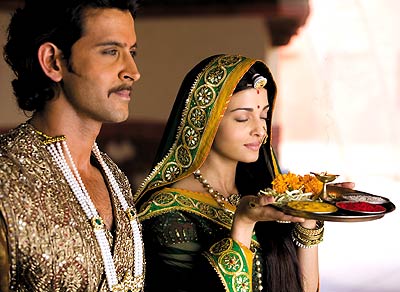
Jodhaa Akbar is a sixteenth century love story about a political marriage of convenience that gave birth to true love between a great Mughal emperor, Akbar, and a Rajput princess, Jodhaa.
Jodhaa is forced to marry the Emperor Akbar to protect her father’s kingdom. Their relationship starts off with a lot of dislike and prejudices. Gradually as they started to live together, she came to feel an awe inspired by his bravery, his fair and just methods of ruling a vast empire, and his strong personality. At the same time, she was amazed by his kindness, goodness of character and respect for her. Akbar in turn was impressed by her beauty, poise and compassion towards others. He fell deeply in love with her but waited for her to reciprocate his love. He built a small temple for her inside her quarters and did not interfere in any of her activities. She learned his language, cooked for him in spite of being the Queen of Hindustan, and when he fell ill, she nursed him with true devotion. They fell deeply in love and their true union took place mentally and physically. They complemented one another and what started as a marriage for political and social obligation turned into a lifetime of eternal love and true devotion.
To raise your relationship to a higher level of harmony, see Strategies to Increase Harmony in Your Relationship
If you would like to raise general questions on romance, love, marriage and relationship or about any of the content in this article, please post your entry in the appropriate forums
Level 8 Appreciation
Partners have learned to understand each other's point of view and to genuinely appreciate the truth, value and validity in it. Relationships at this level are characterized by mutual respect and admiration.
There is always truth in the other person's point of view. It's a universal law without exception, even when that person is your bitter enemy out to destroy you. How much greater is the truth in the viewpoint of the partner who knows you intimately. No matter whether you think your partner's perspective is based on errors, misunderstandings, ignorance or personal preferences, there is always a valid truth in it that deserves recognition and respect. What applies to points of view also applies to every other difference between partners - tastes, preferences, attitudes, sentiments, feelings, habits, etc. Maximum harmony issues from not only conceding the right of your partner to differ from your perspective, but also in striving to genuinely recognize and appreciate the validity of their perspective. Such an effort invariably leads both partners to discover something more true, valuable and suitable than either of their individual perspectives.
Elizabeth & Darcy (Pride & Prejudice)
Differences are a potential problem area for everyone. Ignoring another's defects and preventing minor issues from escalating into problems strengthens the relationship and ensures stability. But what happens when partners actually feel grateful to another for pointing out their faults and both decide to change for the better?
The relationship between Elizabeth Bennet and Fitzwilliam Darcy begins in conflict, evolves into appreciation and is ultimately transformed into romantic love. When Darcy's first marriage proposal goes wrong, they end up arguing and trading bitter accusations. They part in anger, believing they will never see each other again. But gradually they each begin to see the truth in what the other person said in the heat of argument. After struggling to overcome their egoistic sensitivities, each acknowledges that truth and accepts it. Darcy realizes for the first time that other people rightly perceive him as arrogant and offensive. Elizabeth acknowledges that her mind was prejudiced and capable of jumping to false conclusions based on scanty evidence. Darcy transforms his outward behavior to remove all traces of egoistic assertion. Elizabeth stops blaming Darcy for her problems and sees the real cause lies within her own family. Eventually they meet again and marry, achieving a relationship that is unique in its harmony.
They have seen each other's darker side. They neither condemn the other nor romanticize their imperfections. They take it as an opportunity to recognize their own inner deficiencies. That makes them humble, tolerant and forgiving. They learn to see themselves from the other's point of view and change, making tremendous psychological progress. Their differences make them endlessly attractive to one another and keep them together. Because of this realization, what was initially considered objectionable becomes admirable, even lovable. They accept these traits in each other's family members too.
To raise your relationship to a higher level of harmony, see Strategies to Increase Harmony in Your Relationship
If you would like to raise general questions on romance, love, marriage and relationship or about any of the content in this article, please post your entry in the appropriate forums
Level 7 Tolerance
Disagreements are mild and rare and never dampen the strong bond of positive feeling between them. Partners may not always fully agree or appreciate each other, but they have learned to accept and become tolerant of their differences.
Couples at this level share a strong bond of positive feelings. They are always seen to be loving and considerate to one another. Their mutual acceptance, trust, respect and admiration make their relationship stable and beautiful. Accepting and appreciating another is possible only when we eliminate our own egoistic sense of self-importance and superiority or the notion that our opinions and attitudes are somehow more valid than those of our partner. Acceptance and tolerance are the preconditions for true affection and love. Romance arises not when we find the perfect mate but when we do not even see or notice any defects in the other person, because we relate to the person at a deeper level where these things do not matter.
A strong positive relationship is a wonderful blessing, but it can always be made stronger and more intense by conscious effort. Learn not to expect anything from your partner. Rather learn to appreciate freshly their every small positive thoughtful initiative. The more conscious attention we give to the positive aspects of our relationship, the more they will increase. Learn to look at every situation from your partner's point of view and appreciate the truth in that viewpoint. Disagreements will disappear. Only differences will remain.
Mr. & Mrs. Gardiner (Pride and Prejudice)
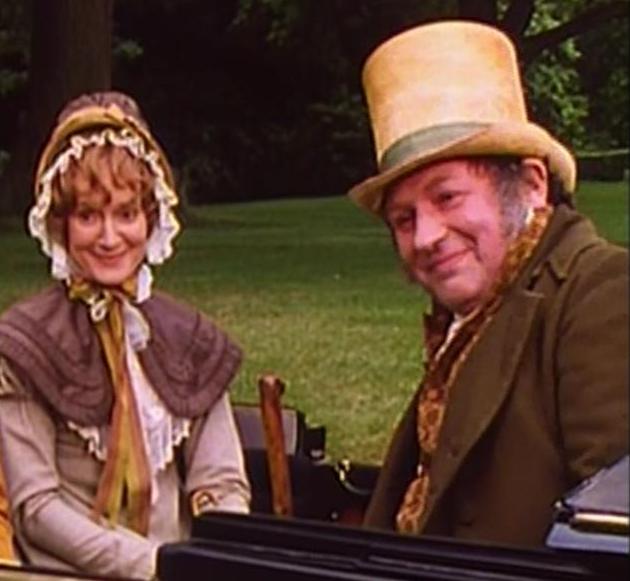
The Gardiners are a happy and harmonious couple. Even when they disagree, their differences never become personal. Their interactions never become negative. They trust each other. They do not need the other's permission to take a decision. They know they already have it. When their vacation plans are altered because of Mr. Gardiner's work, Mrs. Gardiner is disappointed but doesn't fret or complain, she accepts it cheerfully. When Mr. Gardiner decides to set aside a huge amount of money to help his sister's family, he has his wife's ungrudging support even though they both know it affects the future of their own children. They have similar values, and are always able to see the bigger picture. This perspective enables them to ignore minor differences, while nurturing and strengthening their relationship.
Mae & Jim Braddock (Cinderella Man)
We might not expect to find a high level of harmony in the relationship between a professional boxer and his wife. But the marriage of Mae and James Braddock is an inspiring example of complete acceptance and a great tolerance between the partners under conditions of hardship sufficient to provoke most married couples to constant recrimination and acrimony. Jim is an over-the-hill boxer who has to struggle to find work during the Great Depression and what little he can earn is insufficient to provide food and heating for his wife and three young children during the cold winter months in New York. Jim gets a last chance opportunity to re-enter the ring five years later, Mae trembles with fear for her husband's safety and cannot even bear to attend the matches. They desperately need the money, but still she would rather send the kids to stay with relatives than risk his life. Yet knowing how deeply he yearns for self-respect and success, she supports him through a remarkable comeback to become heavyweight champion of the world. The depth of harmony and love between them is the foundation for Jim's incredible achievement.
To raise your relationship to a higher level of harmony, see Strategies to Increase Harmony in Your Relationship
If you would like to raise general questions on romance, love, marriage and relationship or about any of the content in this article, please post your entry in the appropriate forums



 Read how personal conflict can develop into enduring romance.
Read how personal conflict can develop into enduring romance. 
